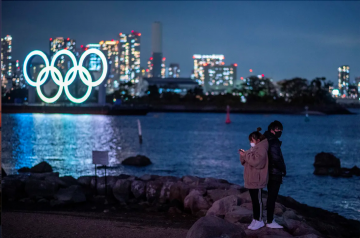
Despite many controversies, the postponed 2020 Olympics are scheduled to run this year from July 23 to August 8 in Tokyo, Japan.
Many feel uneasy at the possibility of a COVID-19 outbreak caused by the Olympics, meanwhile, some commemorate the event as proof that the world can return to normal.
The Olympic committee has stated that the athletes have already started training, so the games must go on as planned. Maintaining the infrastructure for the Olympics for another year is not feasible.
For instance, the Olympic village is to be converted into residency for Japanese citizens. These Olympics are also the most sponsored out of any other Olympics previously held, with about $3.1 billion invested by Japanese companies. Hence, another reason why the Japanese Olympic Committee wants the games to proceed.
“Instead of choosing where the Olympics should be held, whether that country is prepared or not, they should just cancel the Olympics,” says Sihyeon L. a freshman at AISG, “Then there would be less concern about people getting infected,” he adds.
Travel into the country has been highly restricted since six months before the summer Olympics. Only Japanese nationals or those with resident status are allowed into the country.
The International Olympic Committee released a Playbook with COVID-19 guidelines and other rules that athletes must follow inside the host country and during their travels before entering Japan.
Athletes are requested to monitor their health and social interactions 14 days before their trip to Japan. All participants in the Olympics are required to take a COVID-19 test 72 hours before their scheduled flight. Upon their arrival, they will be staying away from the main city, in the Olympic village by the Tokyo Bay, and will receive another COVID-19 test.
Athletes will not be allowed to go to any public spaces, including games venues as spectators, shops, restaurants and bars, gyms, or any tourist areas. The use of public transport will also be restricted unless permitted by the Olympic Committee.
Despite Japan’s strict COVID-19 protocols, only 0.2% of Japan’s population has received the vaccine. Many people such as AISG student Suyeon J. have shown the same concerns. “I am worried about COVID-19,” Suyeon says, “I don’t think that they are well prepared due to the lack of people who have been vaccinated.”

In terms of spectators, only Japanese citizens will be allowed to watch the Olympics. No foreign visitors will be allowed into the country, except for athletes, officials, and certain media personnel.
The maximum capacity for Olympic venues has yet to be decided for Japanese fans, but the Japanese government and the International Olympic Committee have been putting a lot of effort into making the Olympics as safe as possible given the circumstances of the pandemic.
There will be an estimated number of 15,400 Olympic athletes from 205 countries and territories.
Though the host city of the Olympics is Tokyo, some of the events will be spread out through other cities. Soccer will be held in other cities such as Saitama, Yokohama, Sendai, Kashima, and Sapporo.
The surfing event will take place 40 minutes outside of Tokyo in Tsurigasaki Beach in Chiba. Road cycling will be in the foothills of Mount Fuji, and the marathon and race walking events will take place in Sapporo, 500 miles north of Tokyo.
Swimming will start from July 24 to August 1, and gymnastics will take place from July 25 to 3. Track and field will run from July 30 to August 8, the closing of the Olympics.
Other Olympic tournaments will take place throughout most of the entirety of the event, including basketball, baseball, softball, volleyball, beach volleyball, water polo, and soccer. All medals will be awarded during the last day of the Olympics.
The National Broadcasting Company (NBC) will film and provide footage of the events throughout a wide range of channels: NBC, NBC Sports Network, CNBC, and USA Network. Most of the events will air live, and will be broadcasted on tape delay.
Even one mishandled or unnoticed COVID-19 case could result in dire consequences during these Olympics. Many people globally wait with anticipation for the upcoming Olympics. Can things go back to how they use to be, or will these Olympics turn out to be a horribly calculated move?